Introduction
In the changing realm of business endeavors it is imperative for both business owners and investors to grasp the real essence of a companys worth. Valuation of a business stands as a pillar in guiding strategic choices related to trade deals, investment prospects and adherence to legal standards. Through a dive into the complex realm of valuation one can attain a clearer understanding of the value behind a company laying down a solid foundation, for realistic objectives and ambitions.
This detailed guide delves into the stages of assessing a businesss worth. Starting from picking the appropriate approach, to examining financial information and grasping market trends thoroughly.With a grasp of valuation techniques companies can establish a competitive edge allure potential investors and tackle the challenges that come with growth and expansion effectively.
Understanding the Purpose of Business Valuation
Estimating a company is vital for entrepreneurs aiming to sell or assess the value of their organization effectively and precisely for making decisions associated with sales transactions and investment choices, along with fulfilling legal requirements. Grasping the significance of your business through a thorough assessment process aids you in achieving clarity on its worth and allows you to set realistic goals and ambitions. For instance, a 409A appraisal involves an evaluation of a firm's regular stocks' value, which is vital for establishing fair employee stock option prices. Ensuring adherence to tax regulations through assessment helps avoid penalties and establishes a benchmark for equity-based compensation practices, along with understanding your company's position in the industry. Such, as market share and growth potential. Can significantly influence its worth and provide it a strong competitive advantage.
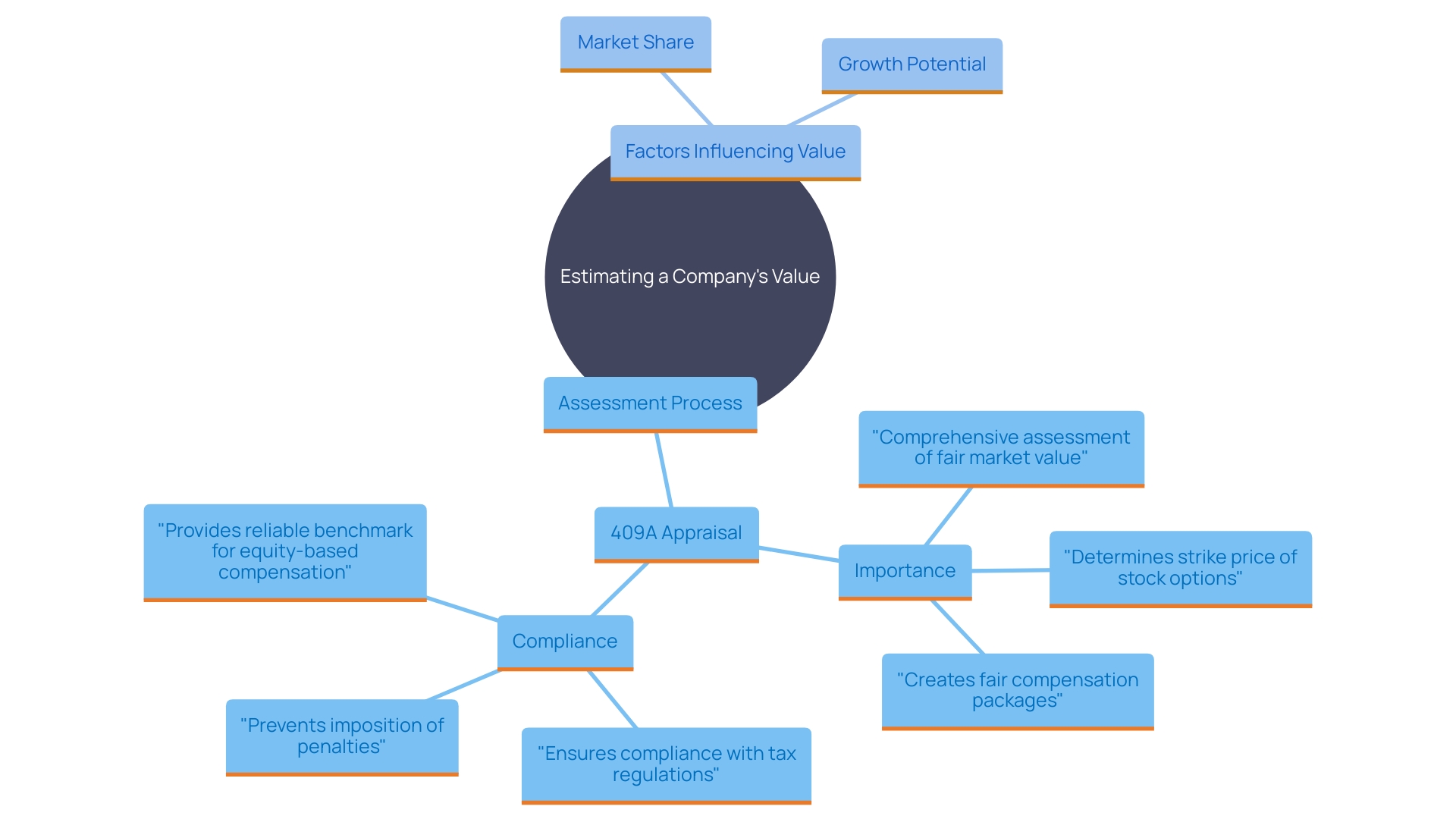
Key Steps in the Business Valuation Process
Initiating the procedure of assessing an enterprise necessitates navigating through a sequence of phases that all contribute to forming a comprehensive and accurate appraisal result. To begin with it is crucial to establish the reason behind the valuation as it sets the tone for the procedure. Whether you are looking for funding opportunities. 'Preparing for a potential sale or simply trying to understand the worth of your enterprise; having a clear purpose in mind is key.'.
Firstly,\ conducting research is crucial. This includes assembling financial records,\ market assessments,\ details about competitors,\ and any other necessary information. Precise data gathering guarantees that the following stages are firmly based in real world insights,\ establishing a strong groundwork, for the appraisal.
Choosing the appropriate assessment method is essential in the evaluation process as it differs based on the business and situations present. For example the Berkus Method introduced by investor Dave Berkus back in the 1990s is specifically beneficial when assessing startups that have limited revenue streams. This technique involves assigning value to components of the venture like the concept itself the prototype and the team, behind it to gain a comprehensive understanding of the companys future prospects.
Upon choosing the approach to use for assessment purposes comes the implementation stage where the selected method is applied to the collected data with precision and skillfulness. This critical step involves analyzing the data to transform it into a monetary figure accurately. Factors such, as market standing, competitive edge and financial well being undergo examination to provide an authentic assessment of the companys value.
Crafting a report is essential in this context as it plays a vital role in presenting the methodology used for data analysis and the resulting findings in a transparent and comprehensive manner to stakeholders so they can grasp and have confidence, in the valuation process.
By following these instructions step by step is important for getting an honest and precise evaluation of your company's worth and lays the groundwork, for making well informed decisions and planning strategically.
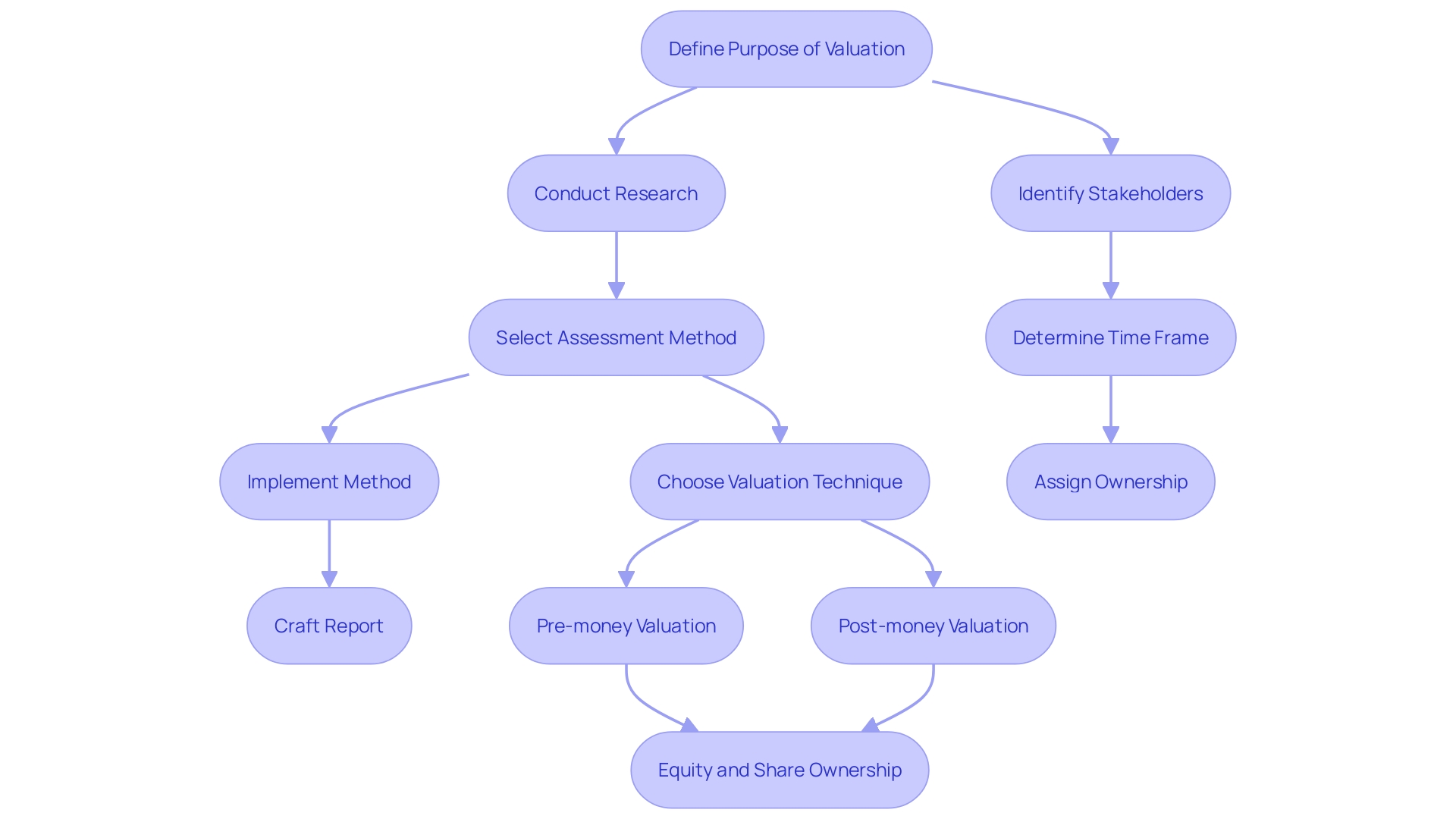
Choosing the Right Valuation Method
To effectively evaluate the worth of your company, it is essential to choose the assessment method. The Market Approach, Income Approach, and Asset Based Approach are the three methods available, each providing unique advantages that cater to different types of enterprises and situations.
The approach evaluates the worth of an enterprise by contrasting it with firms in the sector. This approach is effective for enterprises that possess a presence in their field and a competitive advantage. Significant elements consist of share of the industry, customer loyalty rates and brand recognition. Businesses that regularly introduce ideas and meet customer needs are typically valued more highly.
'The income approach emphasizes evaluating the enterprise's capacity to generate income by thoroughly analyzing its monetary well-being and sustainability of earnings growth projections. Quality of Earnings (QOE) evaluation plays a role in this method as it scrutinizes revenue streams diversity, patterns of customer concentration and economic dependability to offer insights into the company's current and future monetary performance.'.
The asset based approach involves determining the worth of a company by assessing its assets. A method ideal for enterprises possessing tangible and intangible assets like intellectual property (IP). Evaluating the strength and protection of intellectual property assets, such as patents and trade secrets, is crucial since these elements can significantly influence the organization's position and investor confidence.
To determine the valuation approach for your enterprise's attributes like market position and economic well-being, align it with your strengths for a more precise valuation result that is persuasive and accurate.
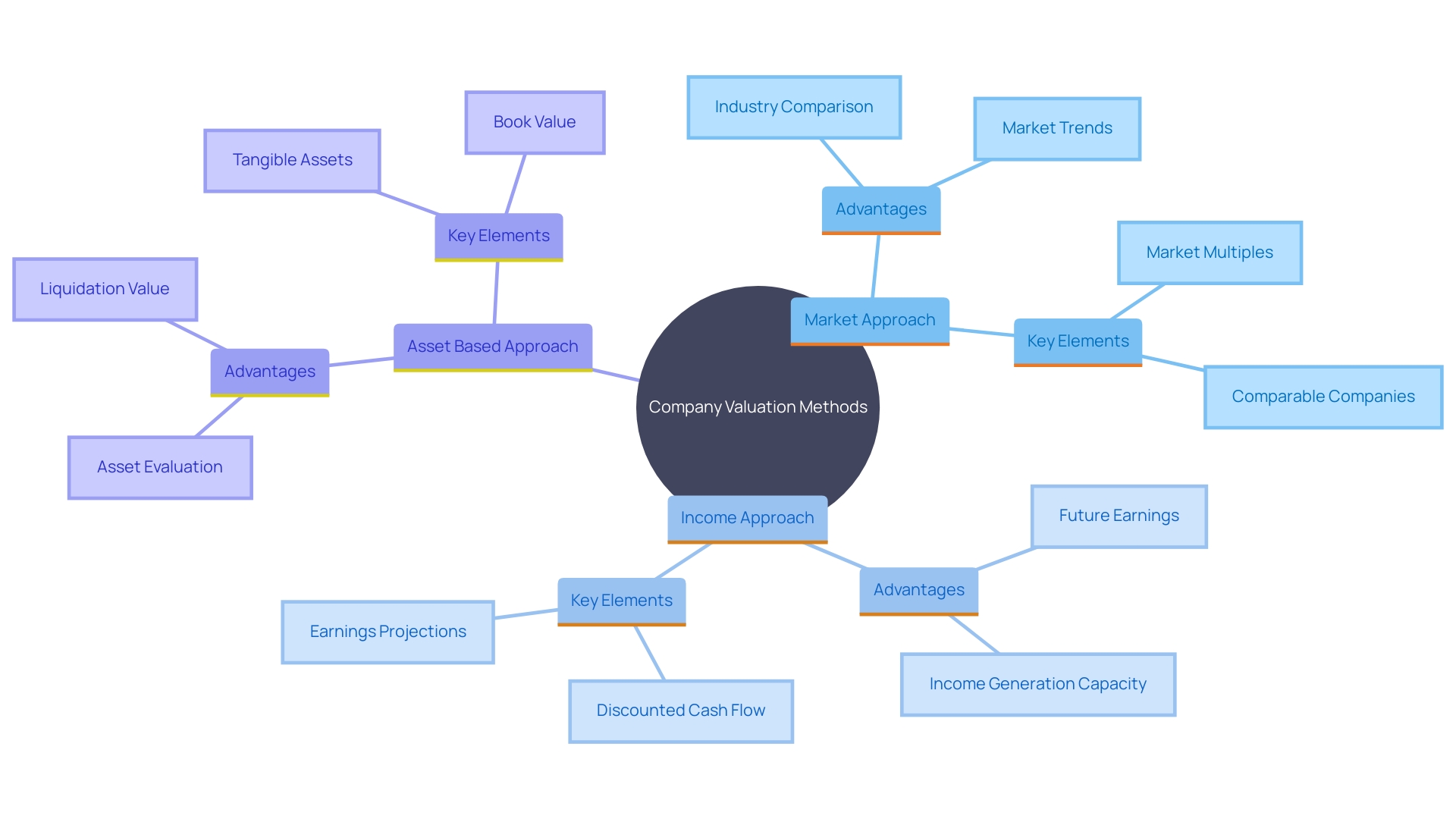
Gathering and Analyzing Financial Data
Gathering detailed monetary information is essential for carrying out a thorough evaluation process. The required documents include previous reports, cash flow predictions, and tax documentation. Analyzing these details transcends simple numbers. It entails uncovering the narrative behind your organization’s accomplishments and future opportunities. This evaluation acts as the basis of your assessment, allowing for informed decisions and building confidence among potential investors or buyers.
With a lack of experienced accountants due to the retirement of seasoned professionals, in the field today it is crucial to maintain precise records and conduct expert analyses to safeguard the integrity of your data amidst this challenging scenario.
Possessing economic data is essential for creating credible and influential projections in the corporate environment today. A good illustration of this is how the banking and monetary services sector (BFS) is increasingly adopting data solutions to manage large volumes of information effectively. This shift highlights the importance of utilizing data for decision making processes and enhancing risk assessment and operational effectiveness—factors essential for accurately evaluating an organization's worth.
Furthermore, it's crucial that the financial aspect of your plan converts your concept into financial projections. This involves considering procurement, distribution, return of investment and managing cash flow. These forecasts are crucial not for persuading potential investors but also, for effectively navigating the competitive market environment.
Financial data that is strong and reliable not only assists in managing your operations effectively at present but also lays the foundation for potential growth and investment opportunities in the future. Whether you're just starting out or experiencing growth phases in your journey. Having precise and thorough financial information is crucial, for demonstrating the genuine worth of your enterprise.
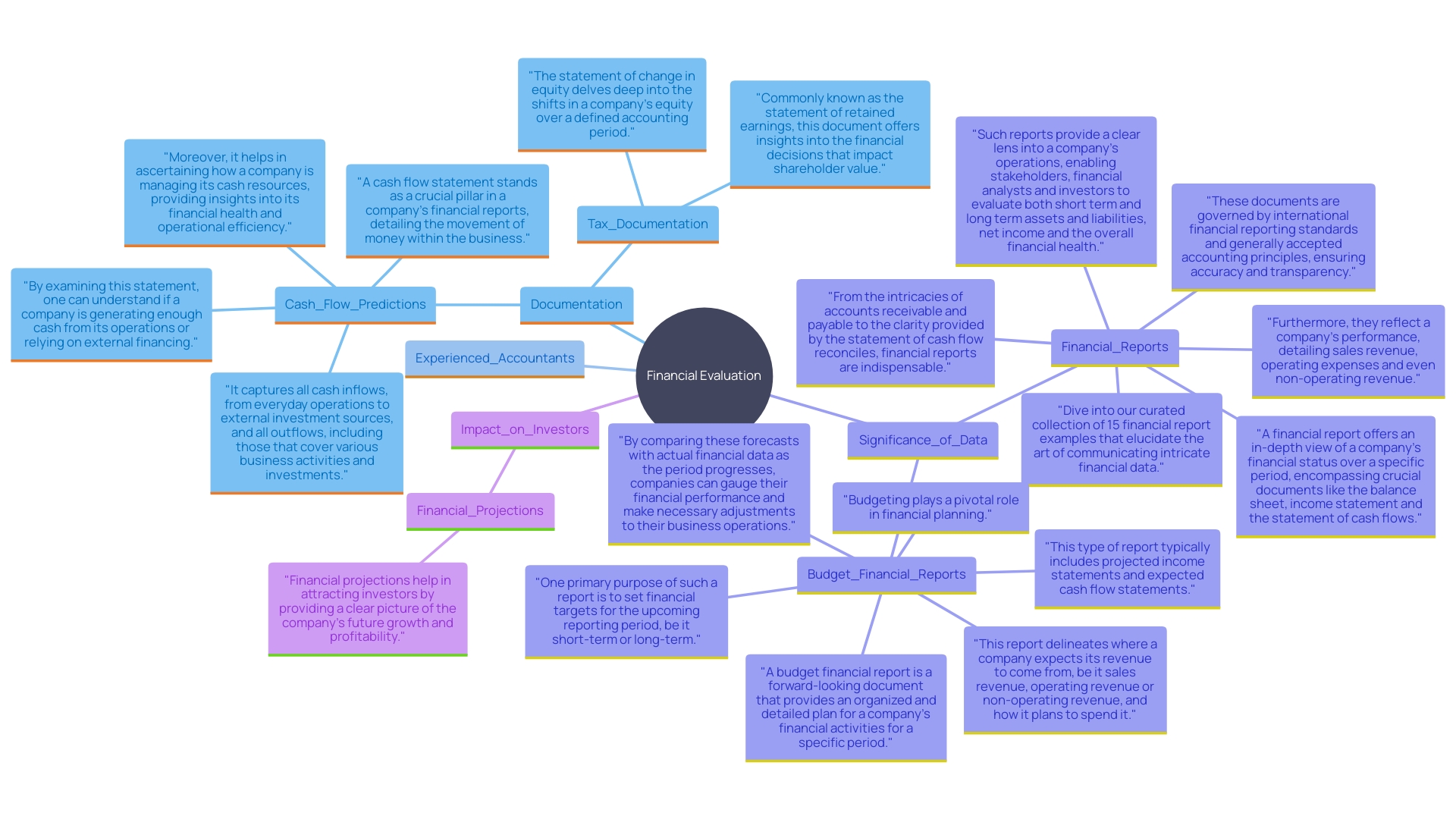
Industry Analysis: Understanding Market Context
'It's essential to conduct an industry analysis to grasp where your business stands in the competitive landscape clearly. Investigating industry trends, navigating competition, and considering conditions can offer valuable insights that have a significant impact on your business value. An instance of this is seen in how the manufacturing sector's moving towards Industry 4.0, which emphasizes the significance of using digital technologies. A recent survey revealed that 83 percent of manufacturers anticipate that smart factory solutions will revolutionize product manufacturing in the next five years.'. It's important to keep to date with these factors to make better judgments and handle obstacles wisely." Paris Heymann of Index Ventures stresses the importance of discipline and patience during times " he says." This method not aids in sustaining appealing valuation measures but also in making well informed choices that encourage development."
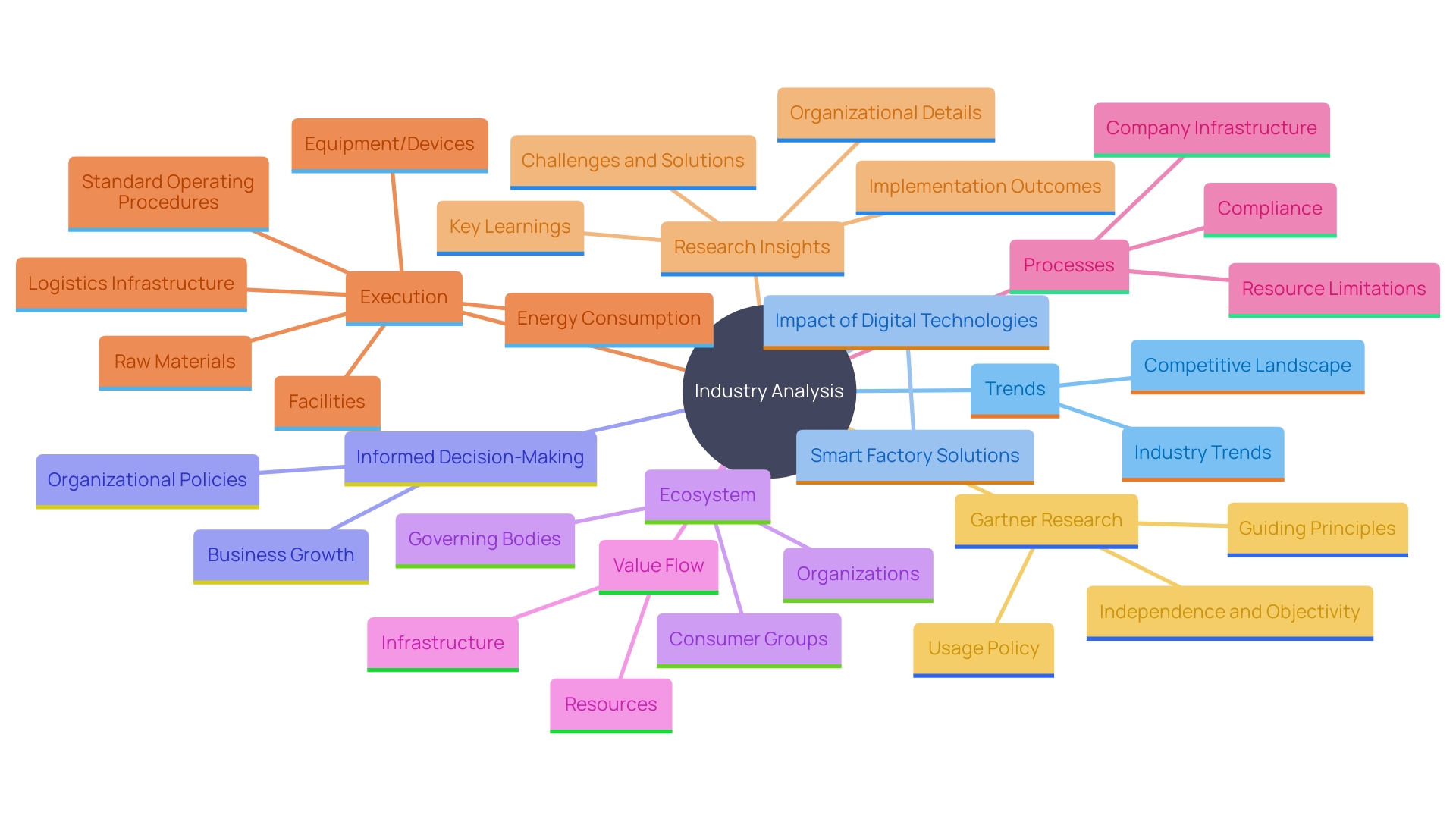
Adjusting for Subjective Factors: Market Conditions, Management Quality, and Economic Environment
Valuation goes beyond numbers – subjective elements also come into play significantly here! Take a software company as an example; exploring its competitive position is key to unlocking its true value potential! A strong position in the industry usually indicates a competitive advantage. Think devoted customers or innovative products backed by cutting edge tech! To truly grasp this aspect you need to look at its market share trends predicted growth patterns. How sustainable its competitive lead is, in the long run. Moreover, changes in the economic landscape like recent shifts in inflation and job rates can significantly influence how your enterprise is valued. By taking into account these changing elements you can reveal the genuine worth of your business that goes beyond just financial numbers.
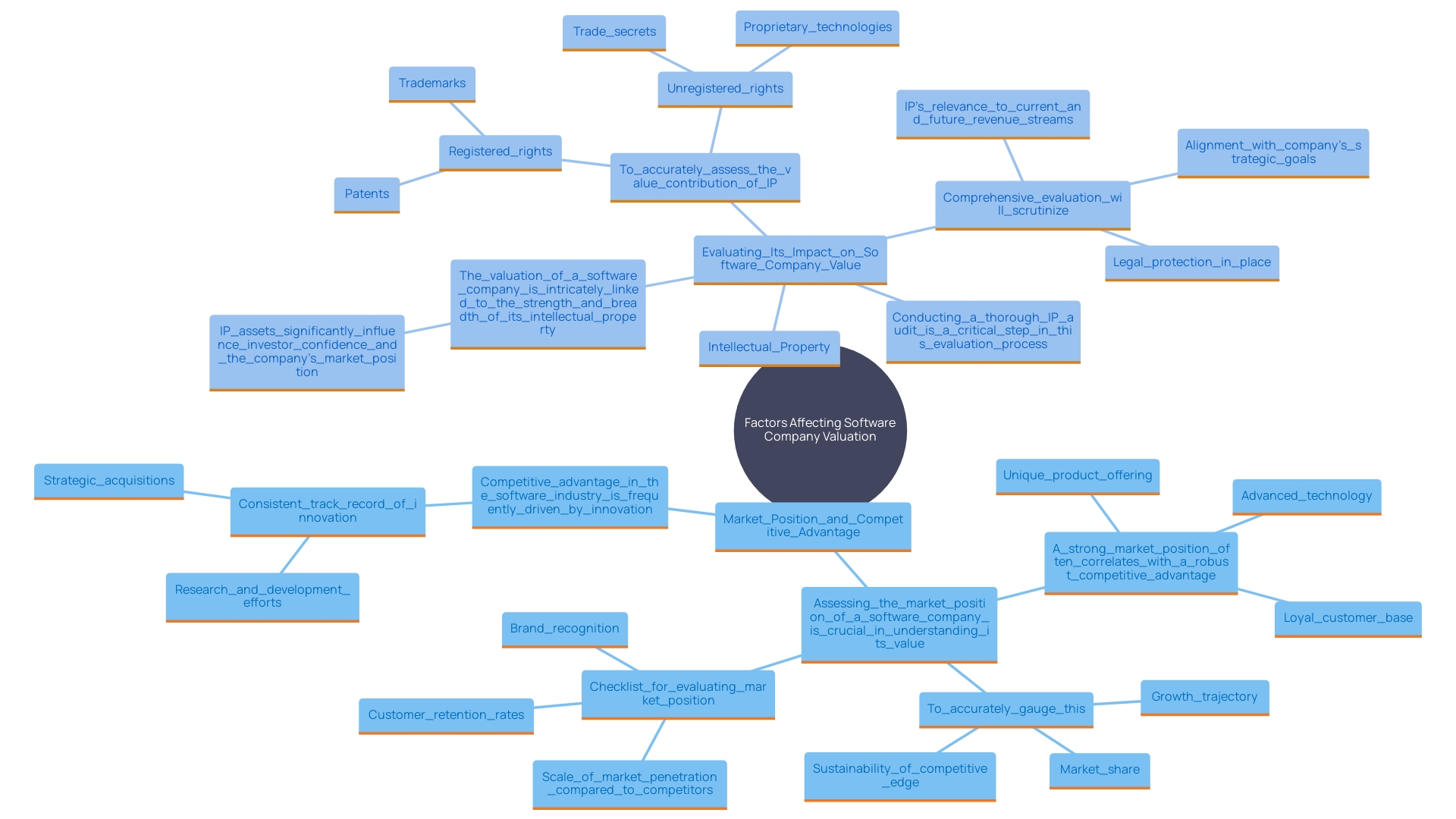
Ensuring Accuracy and Consistency in Valuation Reports
Making sure that your valuation reports are precise and reliable is more than a habit. It's crucial for establishing trust and credibility in negotiations! By using approaches like the ones detailed in the latest International Standard on Auditing for Audits of Financial Statements of Less Complex Entities (ISA for LCE) you'll be able to cater to the unique requirements of smaller companies while upholding strong levels of assurance. It's absolutely essential to have documentation, for all your assumptions and calculations. This approach is particularly beneficial in areas like software development when assessing positioning and competitive strengths requires analysis. Significant elements such as industry dominance and growth trends, along with the capacity to innovate, contribute to the overall role. Businesses that demonstrate a history of innovation and flexibility through continuous research and development initiatives or strategic purchases are usually given higher esteem. Implementing transparent techniques to assess and communicate the actual value generated by businesses can greatly boost their competitive advantage and ability to adapt in the market landscape while empowering stakeholders to make well informed strategic choices in the long run.
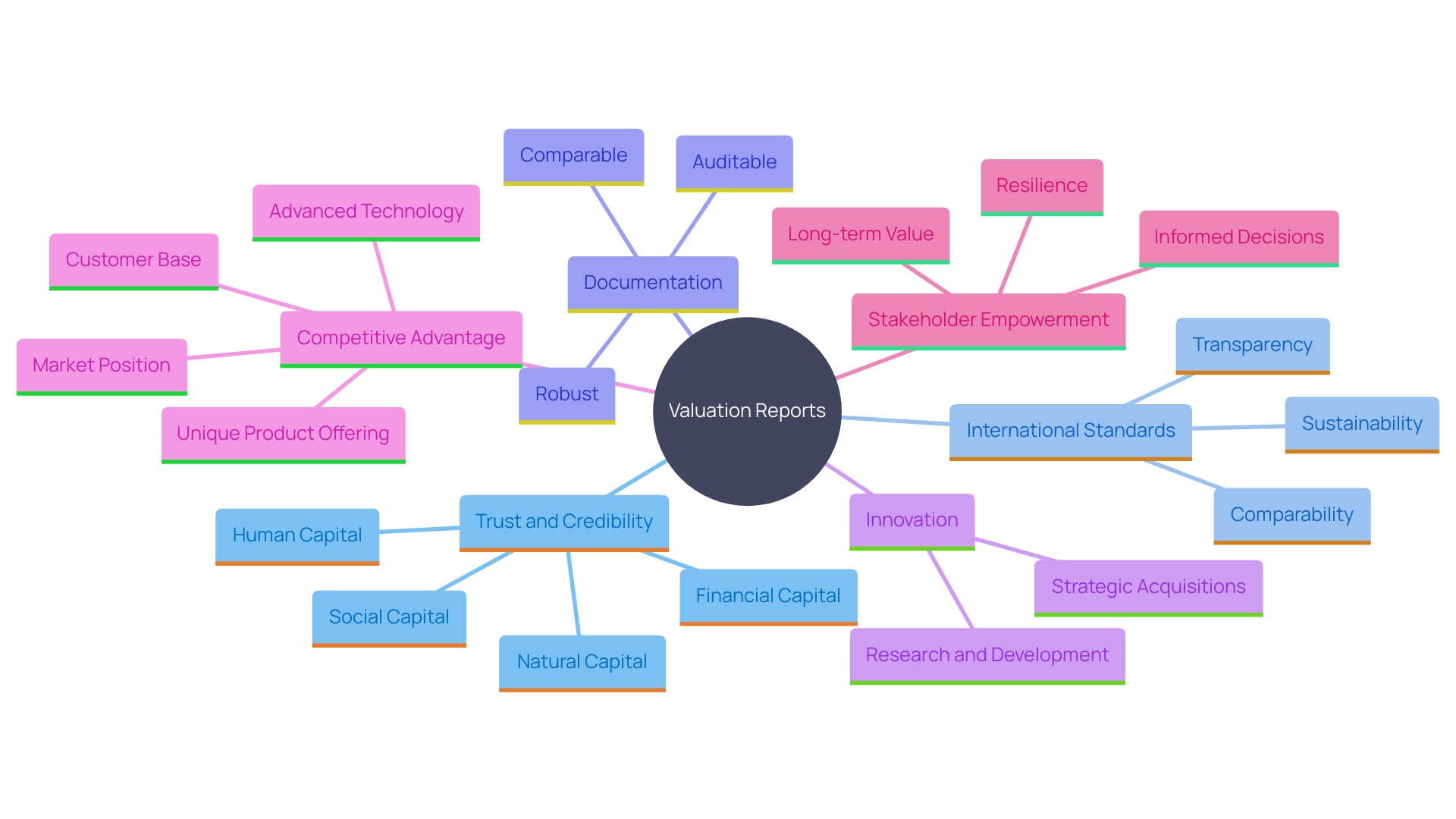
Structuring the Valuation Report: Essential Components
Preparing a value assessment report is essential for obtaining a thorough understanding of the worth and prospects of a company. It kicks off with a summary that summarizes the discoveries and insights in a concise manner to give an overview from the top. This part lays the groundwork for the report by giving a snapshot that proves valuable, for stakeholders who require a swift understanding of the valuation process.
In the following part of the report; methodology section highlights the methods and strategies employed in determining the value of something specific or an asset value assessment process to ensure that it can be easily reproduced and is reliable and credible by giving a deeper understanding of the reasoning behind the figures presented there. As emphasized by professionals in the field or those knowledgeable in this area; having clarity, on the methodology utilized plays a role in guaranteeing that the assessed value is precise and dependable.
The economic assessment goes into detail by thoroughly examining the company's fiscal condition and performance indicators like Earnings Before Interest and Taxes (EBIT), Free Cash Flow (FCF), and revenue figures are thoroughly analyzed. It takes into account adjustments, for one time events and non operational costs to provide an overview that emphasizes the significance of a thorough financial evaluation.
In the section on the industry context of the report explores how the enterprise fits into the industry framework by examining industry trends and competitive positioning along with market dynamics as well as analyzing the structure of the fragmented homebuilding sector and its key players can have a major influence on value.
Ultimately the final thoughts bring together the discoveries. Present a unified overview of the assessment procedure and outcomes. This part connects all the dots to give an brief ending that mirrors the companys worth and opportunities, in the industry.
Every aspect of the valuation report is carefully. Expanded upon to offer a comprehensive and thorough understanding of the business value assessment process for stakeholders to have all the essential details needed to make well informed choices.
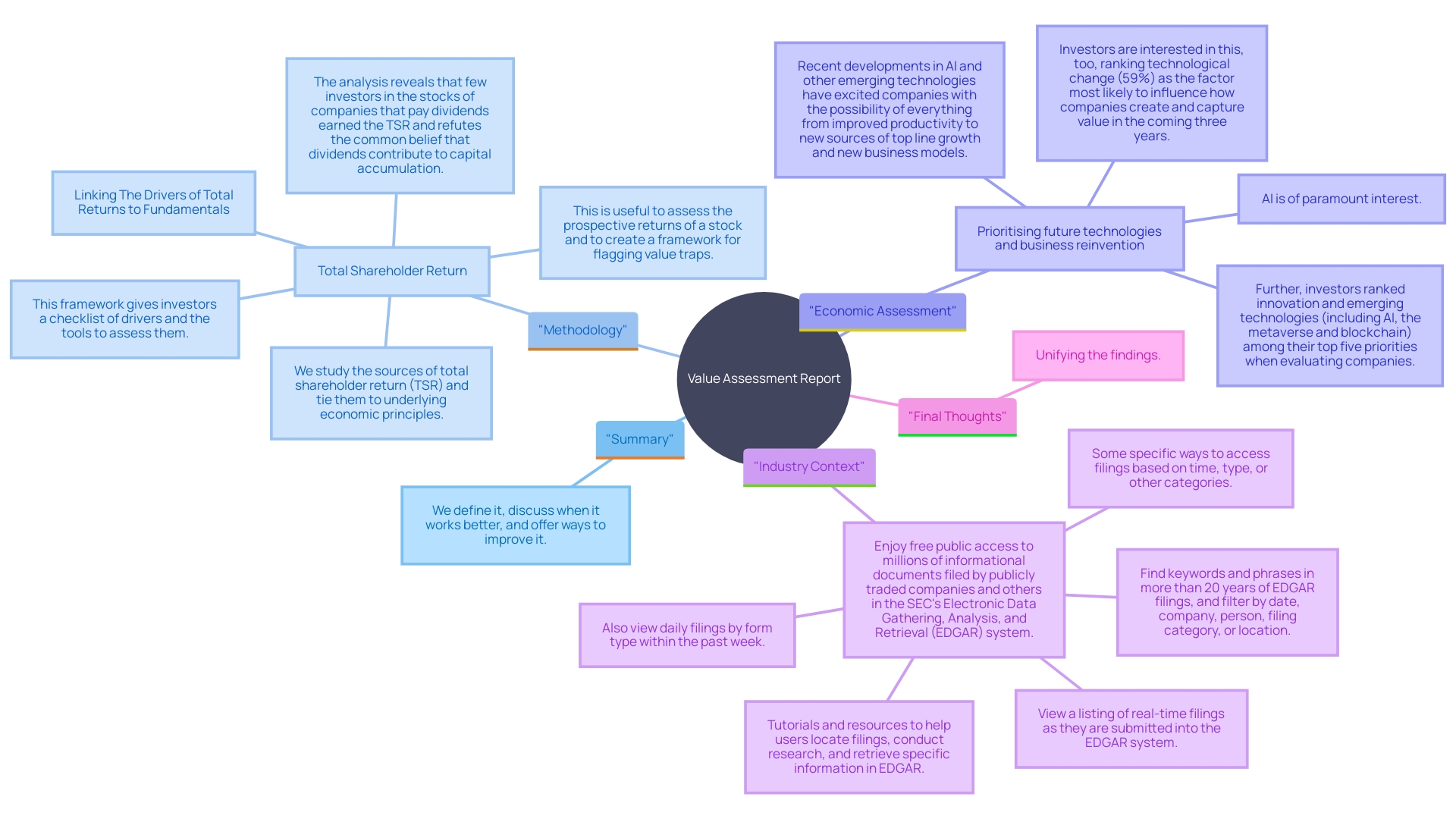
Conclusion
Determining the worth of a company goes beyond just crunching numbers—it plays a crucial role in guiding strategic choices and drawing in investors while also guarantee compliance with legal requirements.The business valuation process involves a path that covers stating the objective drawing financial information into one place evaluating market circumstances and picking the most suitable valuation technique.Every stage is essential to gaining an comprehensive understanding of a firms value which then establishes the groundwork, for future advancement and achievement.
The selection of how to determine the value—whether through market analysis or income assessment—should match the traits of the company at hand. By taking into account elements like market standing and economic climate alongside the competence of management in place a deeper comprehension of worth can be achieved. This insight not assists in making well thought out choices but also bolsters confidence and reliance, with those invested in the business.
Furthermore a crafted appraisal document acts as a potent instrument for conveying discoveries and perspectives strengthening the companys appeal, for investment and ability to maneuver through competitive environments.
Master business valuation is crucial for entrepreneurs and investors looking to seize growth opportunities and achieve success in their ventures By practicing transparent valuation methods companies can gain a competitive edge in the market promoting resilience and flexibility in an ever changing business landscape Embracing these strategies not only enhances a companys reputation but also sets a solid foundation, for a thriving tomorrow.




